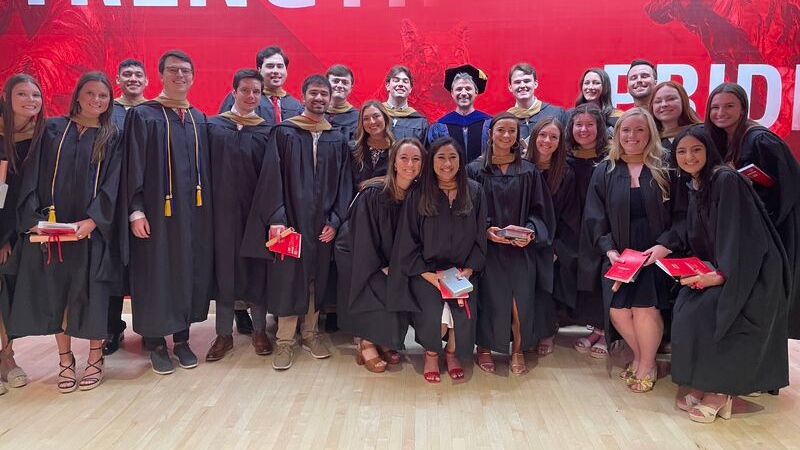Jenkins MAC Students Gain Insight on Tech’s Impact on Their Future Careers
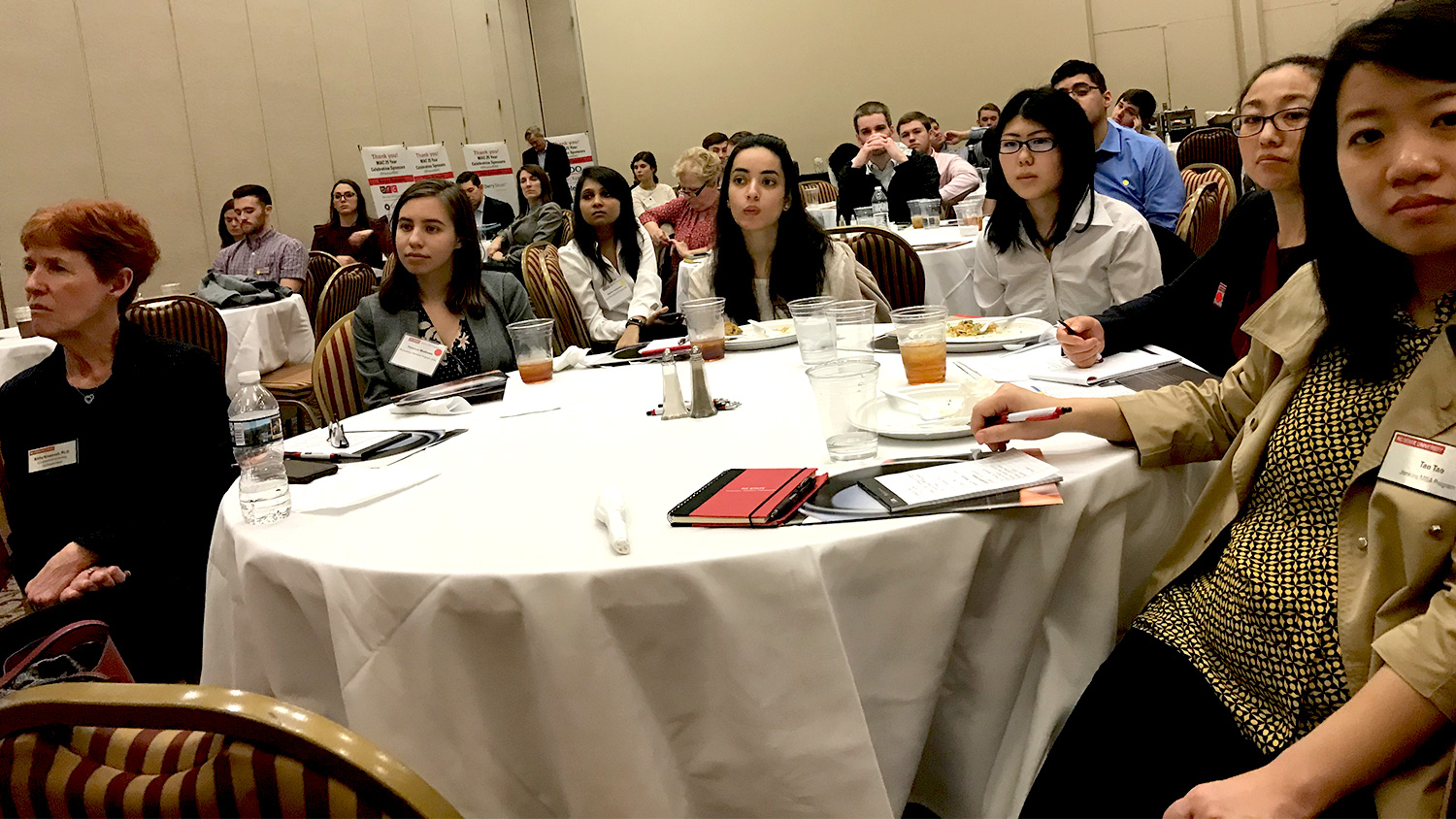
About 100 NC State Jenkins Master of Accounting students – all preparing to launch their careers this spring – gained deeper insight on what those careers may look like as the role of emerging technologies in accounting continues to evolve.
The insight came at the Emerging Technologies Summit hosted by Poole College of Management professors teaching in the college’s Jenkins MAC program. Held February 28 and March 1 at the NC State McKimmon Center, it featured presentations by accounting professionals on the forefront of the integration of technology in the accounting profession.
A key message for the students was that the evolving technologies would indeed shift certain accounting-oriented tasks from manual to machine – including use of Natural Language Processing (NLP) – but, in doing so, it also would enable accountants to focus on higher level functions that support decision making.
We went from the industrial revolution to the era of the internet, and now are entering this fourth revolution – assurance innovation.” – Bryan Crowley.
“Experienced professionals are just starting to work with some of the technologies that were demonstrated at this summit, so it was really a showcase of the incredible things happening in the profession our students will be entering in a few short months,” said Don Pagach, Poole College professor of accounting and chairman of the AICPA Financial Accounting and Reporting Examinations committee for the CPA exam.
Tech’s Impact on Accounting: Augmenting, Not Replacing
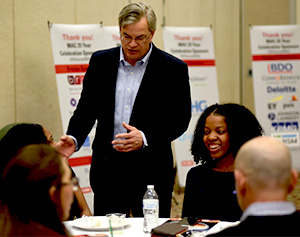
“The main goal for this event was to make students aware of the technologies that accounting firms are adopting and using in the workplace,” Pagach said. “Technology is moving at such a rapid clip that it sometimes seems overwhelming. We wanted to let students know what firms are doing and what they can expect as they move forward as graduates.”
Jonathan Kraftchick, a CPA with Cherry Bekaert in Raleigh, kicked off the event on Thursday night with a discussion on innovation in the profession and a look at how technology is and is not changing the job for new accountants.
The use of Natural Language Generation to automate reports – from sports scores to quarterly financials – was one example of applied technology discussed by Marc Zionts, chief executive officer of Automated Insights. He launched the day’s presentations by discussing how Associated Press and other news organizations are using technology to “unlock meaning behind dashboards,” as described in this TechRepublic story.
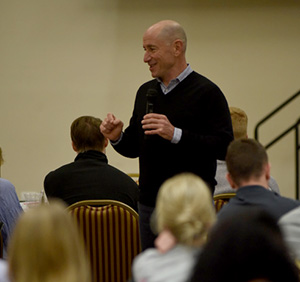
“Natural Language Generation enables people to look at unstructured data and create structured data,” Zionts said.
Citing contract documents saved as PDF files as an example, he said, “All have different terms, conditions and expiration dates, but rather than having a person go through the files and extract the data, NLP technology does that.” The result “is a narrative that sounds like it was written by a person,” he said, noting examples ranging from fantasy football team recaps to earnings reports.
“All these technologies coming into our world – they don’t replace you, they augment you … so you can do more, different work,” Zionts said.
“Journalists could say, ‘I used to do this (manual data crunching)… but it was the most mundane, miserable reporting (assignment)’,” Zionts said. “Now, the technology writes (the reports) based on the data,” and journalists can focus on “qualitative, investigative reporting.”
“In the world of business intelligence, we’ve been on the journey to help people understand data,” he said, citing the transitions from ledgers to spreadsheets to the Tableau analytics platform.
If you share a spreadsheet, he said, “about 10 percent of the recipients will understand. If you add visualization, about a third understand.” But using technology like Tableau can transform the data, organizing and making it more understandable, which enables the data users to dig more deeply into the details. This leads to increased data literacy, making it understandable by more people and enabling value-added discussion.
Similarly, Zionts said, a scatter diagram can provide descriptive data, telling you what is going on, why it is happening, what’s going to happen, and what you should do about it. “You can look at the same data from four perspectives,” he said, so different functions within an organization can make a decision based on the business intelligence relevant for their specific roles.”
Three key things matter as technology evolves: integrity of the data, governance, and diversity of perspective by those looking at the data, to avoid bias, Zionts said. “People who understand the technology and how to work with it will be in demand,” he said, adding that “basic coding skills and data science are going to be fundamental.”
The summit reflects a focus on technical preparation that has been at the Jenkins MAC program’s core from the beginning, as noted by Craig Lupton-Smith (’95), in a December 2018 MAC news story.
Further, students entering the program this fall will complete a new two-week immersion in data analytics at the start of their first semester.
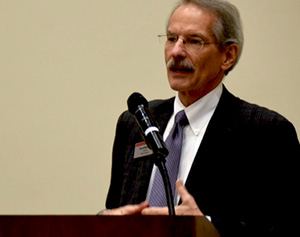
“The skills learned in the immersion sessions will provide a foundation needed for the faculty to add data analytics cases and exercises into other MAC courses, such as Advanced Taxes and Advanced Auditing,” said Scott Showalter, professor of practice and NC State Jenkins MAC Program director.
“Six Poole College accounting professors are developing the modules, with the goal of assuring all MAC graduates develop a solid foundation in data analytics and how to apply the skills in the accounting profession,” he said
New Opportunities through Technology
In breakout sessions, students heard from professionals from EY, Theory Land, KPMG, PwC, Deloitte, and the Center for Innovation Management Studies based in Poole College, about how they are incorporating technology, including robots, blockchain and artificial intelligence (AI), in their operations.
Bryan Crowley, senior manager at Deloitte, works with clients, investors, industry groups, and academia to identify and incubate assurance services and products that are compatible with these latest technologies.
“We went from the industrial revolution to the era of the internet, and now are entering this fourth revolution – assurance innovation,” he said. This latest stage is fueled by the explosion of data largely driven by decreased costs of computing, transmitting and storing data. “Capture it – and then figure out what to do with it later. That falls to us; how are we going to use it,” he said.
“It’s not ‘the sky is falling’,” Crowley said. Rather, he encouraged the students to think in terms of concepts, and to consider technology as the tools needed to facilitate the application of those concepts.
He gave an analogy: “If you are building a house, do you ask the carpenter what kind of a hammer he uses? It’s the same with data tools. There are so many different options that people fail to think about what they are trying to solve, and end up with decision paralysis. But if you can solve a problem with one coded tool, you can solve with other tools.”
The key is to use the correct tool for the problem that needs to be solved, and to know how to use it.
MAC Students’ Key Takeways
Following the presentation, MAC students Jadaya Miller, Nefertiti Peoples and Sylvia Richardson were among students discussing some of their takeaways, including the role of AI being to “make things more efficient for us, moving away from the mundane but we still have to understand the process that AI is doing,” and how to “validate controls when AI is doing so many of these processes.”
In their post-session discussion, MAC students Matt Ray, Landria Brown and Caroline Harrison discussed the ongoing evolution of technology. Jocelyn Rosario noted that Excel was once “wonderful – we could do all these things with it, but now we consider that manual and will have to learn (new technologies). “It’s exciting, but will we be in one lane (career path), or all lanes?”
“I love this whole thing,” said Rachael Hamrick. “I feel it’s very relevant, and as we are emerging into the workforce, we can apply it to what we will be doing.”
Harrison Parker, who was among those attending a session on blockchain, also came away with a positive perspective. “What’s encouraging to me is that even though the landscape of technology is changing the way we work, it doesn’t change how we will work.” Evan Lassiter concurred. “Maybe the jobs we started with won’t exist, but there will always be higher level jobs.”
- Categories:
